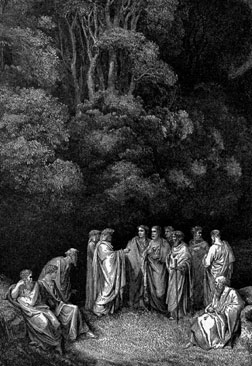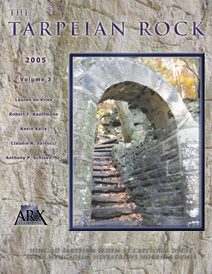
Posted on 02/07/2005 12:27:33 PM PST by Antoninus
Tastes and interests change in literature. Different themes, different styles, indeed whole different genres come in and out of being depending on the spirit of the age.
Nevertheless, there is something to be said for a “classical” style—not in a restricted sense as the style of Greco-Roman antiquity, nor any later genre which took inspiration from it—but rather a super-cultural literary style that rises up above its own genre and belongs as much to the ages as its own time period.
This is the old concept of the “Republic of Letters”—a community not of time and space but of ideas, stories and words. A community where a Roman Vergil can pick up the story of a Greek Homer 800 years later. Where an Italian poet can construct an epic around a tome of Christian theological questions and answers, which in turn was a response to the musings of a pagan philosopher. We have heard these works collectively called the Western Literary Canon—but the Republic of Letters is more than just a collection of books, it is a society of people who read, appreciated and added to those works great works of their own.
The citizens of this Republic form a school of literature unlike any other. And like any great school, it is not merely a haphazard collection of teachers, but a carefully selected faculty all tied together by a common philosophy of moral virtue.
Every author who enrolled in that school imitated and modeled his work on the giants that went before him. Literary imitation has become a dirty word to those modernists who insist on being “creative” and “finding their own voice.” Creativity, however, is made fruitful by discipline, and there is no denying that a man well trained in the rather unforgiving laws of physics, can build a more impressive monument than the man who piles bricks to the best of his “natural” ability.
Modernists like to point to a straight line of Western cultural development that goes through all the greats but ends, quite inexplicably, with themselves. In their own self-serving histories of Western art, modernism is the pinnacle, the culmination, the completion of all the advances that went before. Art has indeed turned down a path of modernized secularism and moral indifference these last hundred years. But a convincing case could be made that it is a path not of development, but rather of diversion—that in the very act of deliberately rejecting the Western Canon (and its morality), they have written themselves out of it.
|
|
 |
| Dante, Vergil, and the classical poets by Doré. |

ping
 and that is all I am going to say. :-)
and that is all I am going to say. :-)
Well, that's either a rag on the author's writing style, or a potential solution to the problem. Or both. You'll have to clarify. :-)
Nice essay, and an interesting website (Arx), too. Thanks for posting.
Thought you might find this interesting.
Thanks...and if anyone out there DOES write like that anymore, Freepmail me posthaste :)
literary ping.
bttt
Oh, and hi, cy!
Oh, and hi, cy!
Hellooo :-)
Bump for E. B. White. (Wish I paid more attention to "the little book".)
I dunno. It's about what works for the author. Hemmingway's style certainly isn't classical in any manner--indeed, it's simple to the point of being juvenile, but it works. He's a titan. Vonnegut also comes to mind.
Hard to say, this "art" stuff.
Pong
Thanks. Some interesting points. It makes me think of some of the letters and diaries I've read of Civil War soldiers. Their spelling and punctuation, in those unstandardized times, were truly bizarre; however, if you read aloud, their composition is usually very clear and elegantly phrased, because they were used to listening to the Bible, some of the classics, and newspapers written by journalists with a classical education.
Truly good writing is not about people -- heroes and villains, victims and victimizers, strong men and weak -- but about the ideas that make them somewhat more than human.
Michael Sharra's "Killer Angels" is not exclusively about the Civil War, but about the influence of belief systems in giving superhuman strength to the weakness of human flesh, and such is the nature of the literature of ideas.
Humanity is an animal made most remarkable by its ability to communicate. It is language ability which elevates us, and it is the ability of language itself to rise above its origins by making it possible to describe ideas and concepts which have no clear analogues in the physical world. This is world which is accessed in this remarkable realm of letters.
>>Michael Sharra's "Killer Angels" is not exclusively about the Civil War,
That's a great book. Might need to dig that out of my bookcase and re-read it.
Interesting point, Bob. "Killer Angels" was very good. Jeff Shaara's books are not as good.
Disclaimer: Opinions posted on Free Republic are those of the individual posters and do not necessarily represent the opinion of Free Republic or its management. All materials posted herein are protected by copyright law and the exemption for fair use of copyrighted works.